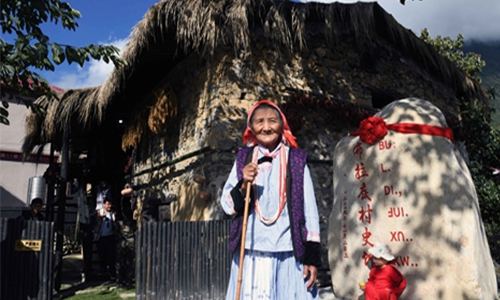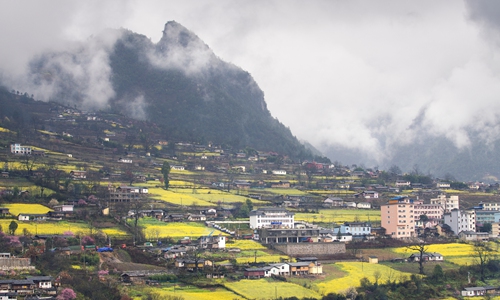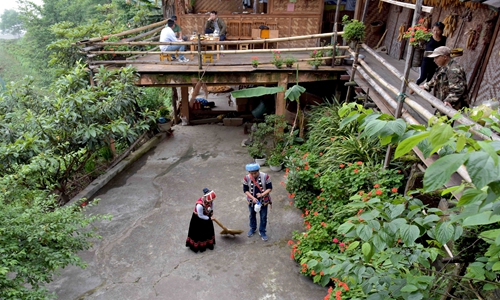
A woman of the Lisu ethnic minority in the Nujiang Lisu Autonomous Prefecture on November 3, 2019 Photo: Xinhua

The Nujiang Lisu Autonomous Prefecture in Southwest China's Yunnan Province Photo: VCG
With spring in the air, Yu Guisheng, a guesthouse owner, has been busy these days catering for the crowds of tourists who are flocking to his home village tucked away in the grand Nujiang River valley, Southwest China's Yunnan Province.
Yu's family of four runs the guesthouse in Qiunatong Village, Nujiang Lisu Autonomous Prefecture. As a key passage from Yunnan into the Tibet Autonomous Region, the village has become a hidden gem for adventurous travelers with its gorgeous blend of towering mountains, lush forests and deep gorges.
The guesthouse provides food for a daily average of 100 tourists these days and about half of its 11 guest rooms are booked each day, reaching an average daily revenue of about 3,000 yuan ($425).
"We can barely stand after a day's work," Yu said.
"This partly makes up for our loss during the Spring Festival holiday when all our bookings were canceled due to the coronavirus outbreak."
"It's hard-earned money, but our life is much better now than the old days when we could barely live off the land," he added.
The 41-year-old Yu recalled that his family led a meager life by growing corn and highland barley before they opened the homestay in 2008. Like many of his fellow villagers, Yu's family had to crowd into a shabby double-decker log cabin at that time, with their home-bred pigs staying on the ground floor.
Official data showed that Qiunatong was then home to 390 households, and over 80 percent of them lived under the national poverty line. The villagers, most of whom are from the Nu ethnic group, had been mired in abject poverty for generations due to poor transport infrastructure.
To carry food and daily necessities into the village, Yu and his fellow villagers used to travel with horse caravans on dirt roads for three to four months every year before blizzards blocked the roads.
As more money makes its way into Chinese people's pockets, many are keen on travel that can bring them closer to nature. In 2008, Yu opened the first ever guesthouse in Qiunatong, as he found that a growing number of tourists were visiting the village but lacked accommodation options.
"It was a bold move, and I never expected that our homestay business would be so successful ever since," Yu said.
"More and more tourists have come here over the years. With the money earned, we have expanded our guesthouse and led a better life."
Yu said he expects more visitors this year with the newly built highway linking the village with Lushui, the prefectural capital and transport hub.
Like Yu, many villagers in Qiunatong have cashed in on the flourishing tourism sector to shake off poverty.
Two other families in the village followed Yu's footsteps and opened guesthouses of their own.

A guesthouse in the Nujiang Lisu Autonomous Prefecture Photo: Xinhua
In 2018, a total of 57 impoverished villagers established a handicraft workshop with subsidies from the local government to produce handmade tapestries and ethnic garments.The handicrafts are sold to tourists or over e-commerce platforms. The workshop registered annual sales of 110,000 yuan in 2019, bringing a dividend of 600 yuan to each of its founders.
Li Wenming, deputy chief of Bingzhongluo Township which administers Qiunatong, said about 157,100 domestic and overseas tourists visited the township in 2019, and most of them included Qiunatong in their itinerary.
The booming tourism industry and the local government's anti-poverty efforts helped lift 57 households in Qiunatong out of poverty in 2019. The village now has only five households living under the national poverty line, Li said.
"It's great to see that the villagers are benefiting from the mountains and gorges that once barred their ancestors from the outside world and left them in poverty," Li said, adding that the local government will further work on improving infrastructure and training villagers to better meet the needs of tourists.

